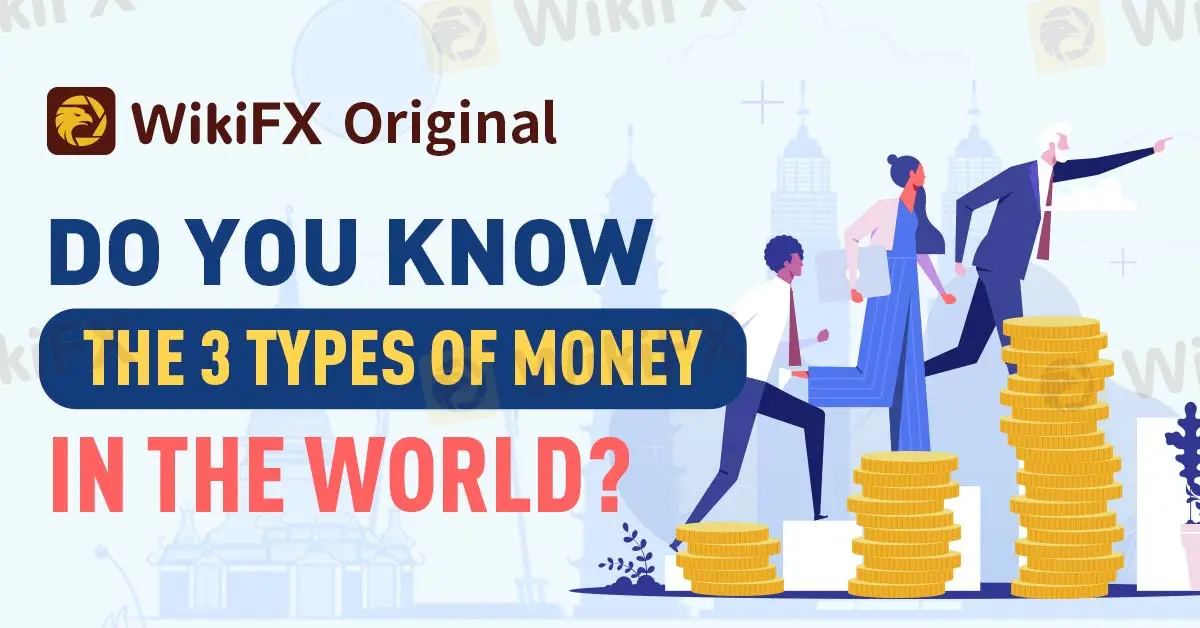简体中文
繁體中文
English
Pусский
日本語
ภาษาไทย
Tiếng Việt
Bahasa Indonesia
Español
हिन्दी
Filippiiniläinen
Français
Deutsch
Português
Türkçe
한국어
العربية
Do You Know the 3 Types of Money in the World?
Abstract:In this day and age, the masses have been brainwashed to believe that money is everything. Many equate having money to having happiness, success, social status, and everything else that matters. Although it is not an absolute fact, there is some degree of logic behind the obsession with money today.

Despite dealing with money on a day-to-day basis and having a certain degree of obsession with money, do you know the 3 types of money in the world? Money is not solely the numerical figures in your bank account or the cash you hold in your hands. It is more than that, so keep reading for more.
Money as a financial instrument can be divided into three types. Though many other derivative products carry intrinsic monetary values, they are not accepted as an immediate payment form that could be used in exchange for goods and services.

Commodity money is a financial instrument that has been around for the longest period. In the olden days, humans used salt, beads, seashells, tobacco, silver, and gold as money in exchange for goods and services. As civilization advanced, a standardized system of trade was also developed. Unlike later forms of money, commodity money has a tangible store of value that is believed to withstand the test of time as its physicality gives users confidence in it. The commonly acknowledged and accepted commodities are gold, silver, uranium, and more.

Fiat money originated as pieces of paper during the Chinese Tang dynasty in the 11th century, making China the first country to use fiat money. Government officials authenticated Fiat money as a legal tender. It is not backed by any commodity, such as gold or silver. It could neither be redeemed nor converted. Its value is derived from government backing, allowing individuals and businesses to place their trust in it as long as they have faith in their government.

Representative money is a government-created instrument backed by a commodity or fiat currency. It generally represents something valuable but has little or no intrinsic value. Checks, credit cards and fiat money are the main examples of representative money that we use on a daily basis. The value of presentative money is derived from the government or the financial institutions that support it.

Disclaimer:
The views in this article only represent the author's personal views, and do not constitute investment advice on this platform. This platform does not guarantee the accuracy, completeness and timeliness of the information in the article, and will not be liable for any loss caused by the use of or reliance on the information in the article.
Read more

The Daily Habits of a Profitable Trader
Every professional trader follows a structured approach to ensure they are well-prepared, disciplined, and able to seize opportunities with confidence. Whether you are a seasoned investor or an aspiring trader, adhering to a robust daily checklist can significantly enhance your performance. Use this checklist to check if you are a qualified trader

How a Housewife Lost RM288,235 in a Facebook Investment Scam
A 47-year-old housewife in Malaysia recently fell victim to an online investment scam, losing a substantial sum of RM288,235 after engaging with a fraudulent scheme advertised on Facebook.

A Trader’s Worst Mistake: Overlooking Broker Reviews Could Cost You Everything
In today’s digital age, reviews influence nearly every decision we make. When purchasing a smartphone, television, or home appliance, we pore over customer feedback and expert opinions to ensure we’re making the right choice. So why is it that, when it comes to choosing an online broker where real money and financial security are at stake many traders neglect the crucial step of reading reviews?

Interactive Brokers Launches Forecast Contracts in Canada for Market Predictions
Interactive Brokers introduces Forecast Contracts in Canada, enabling investors to trade on economic, political, and climate outcomes. Manage risk with ease.
WikiFX Broker
Latest News
The Withdrawal Trap: How Scam Brokers Lure Victims into Paying More
FCA to Investors: Think Twice Before Trusting These Brokers
Trump\s tariffs: How could they affect the UK and your money
Trump gambles it all on global tariffs he\s wanted for decades
TradingView Brings Live Market Charts to Telegram Users with New Mini App
Trump tariffs: How will India navigate a world on the brink of a trade war?
Interactive Brokers Launches Forecast Contracts in Canada for Market Predictions
Authorities Alert: MAS Impersonation Scam Hits Singapore
IG Group Acquires Freetrade for £160M to Expand UK Investment Market
U.S. March ISM Manufacturing PMI Released
Currency Calculator







